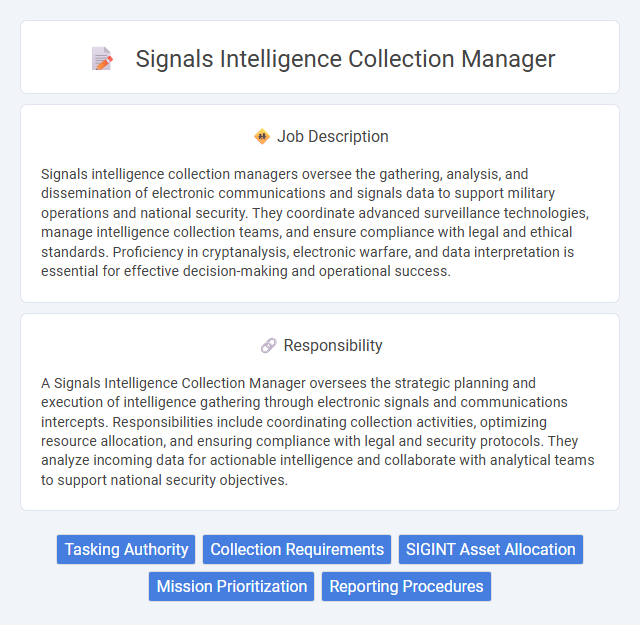
Signals intelligence collection managers oversee the gathering, analysis, and dissemination of electronic communications and signals data to support military operations and national security. They coordinate advanced surveillance technologies, manage intelligence collection teams, and ensure compliance with legal and ethical standards. Proficiency in cryptanalysis, electronic warfare, and data interpretation is essential for effective decision-making and operational success.
Individuals with strong analytical skills and a keen attention to detail are likely suitable for a Signals Intelligence Collection Manager role, as it requires processing complex data and making strategic decisions. Those who work well under pressure and possess excellent communication abilities may have a higher probability of success in coordinating intelligence operations. People who struggle with confidentiality or multitasking might find this position challenging due to the sensitive and dynamic nature of intelligence collection.
Qualification
A Signals Intelligence Collection Manager typically requires a bachelor's degree in cybersecurity, intelligence studies, or a related field, paired with extensive experience in signals intelligence (SIGINT) operations and data analysis. Proficiency in electronic surveillance technologies, cryptographic systems, and intelligence gathering techniques is essential, alongside security clearance authorization. Strong leadership skills and the ability to coordinate multidisciplinary teams to optimize intelligence collection and processing are also critical qualifications.
Responsibility
A Signals Intelligence Collection Manager oversees the strategic planning and execution of intelligence gathering through electronic signals and communications intercepts. Responsibilities include coordinating collection activities, optimizing resource allocation, and ensuring compliance with legal and security protocols. They analyze incoming data for actionable intelligence and collaborate with analytical teams to support national security objectives.
Benefit
A Signals Intelligence Collection Manager likely benefits from access to cutting-edge technology and classified information, enhancing expertise and career growth opportunities. This role probably offers high job security due to the critical nature of intelligence work in national security. Competitive salaries and specialized training are often part of the compensation package, improving professional development and long-term benefits.
Challenge
Signals intelligence collection managers likely face complex challenges involving the coordination of diverse data streams and the integration of cutting-edge technology for real-time analysis. Managing the confidentiality and security of intercepted communications probably adds another layer of difficulty due to ever-evolving cyber threats. The role may demand quick decision-making under pressure, balancing resource constraints with the need for actionable intelligence.
Career Advancement
A Signals Intelligence Collection Manager oversees the strategic gathering and analysis of electronic communications to support national security objectives, enhancing operational decision-making. Career advancement opportunities in this field typically lead to senior roles within intelligence agencies, including positions such as Intelligence Operations Director or Cybersecurity Program Manager. Developing expertise in emerging technologies and obtaining security clearances are critical factors that accelerate progression and increase responsibilities in this specialized domain.
Key Terms
Tasking Authority
The Signals Intelligence (SIGINT) Collection Manager oversees the tasking authority responsible for directing collection assets to acquire critical intelligence data. This role involves prioritizing and synchronizing collection requirements to optimize resource allocation and ensure timely delivery of actionable intelligence. Expertise in managing tasking processes enhances mission effectiveness by aligning collection efforts with strategic intelligence objectives.
Collection Requirements
A Signals Intelligence Collection Manager oversees the development, validation, and prioritization of collection requirements to ensure actionable intelligence is gathered efficiently. They coordinate with analysts and operational units to align collection strategies with mission objectives, optimizing resource allocation across electronic, cyber, and communication channels. Expertise in translating high-level intelligence needs into specific collection tasks enhances timely identification of threats and supports national security decision-making.
SIGINT Asset Allocation
A Signals Intelligence (SIGINT) Collection Manager specializes in the strategic allocation and management of SIGINT assets to optimize intelligence gathering operations. This role involves analyzing intelligence requirements, coordinating asset deployment such as electronic sensors, cryptologic devices, and intercept systems, and ensuring efficient coverage of target communications. Effective SIGINT asset allocation enhances situational awareness, supports national security objectives, and maximizes resource utilization across multiple signals intelligence missions.
Mission Prioritization
Signals intelligence collection managers prioritize mission objectives by analyzing data requirements and allocating resources effectively to maximize intelligence value. They coordinate collection efforts across multiple platforms, ensuring timely and relevant signal intercepts that support strategic and tactical decision-making. Their role is critical in balancing competing demands to deliver actionable intelligence that enhances national security operations.
Reporting Procedures
Signals intelligence collection managers implement structured reporting procedures to ensure accurate and timely transmission of gathered intelligence data to relevant agencies and decision-makers. They standardize formats and verify data integrity to maintain consistency across multiple reporting platforms. Effective reporting procedures enable prompt analysis, enhancing situational awareness and operational decision-making.
 kuljobs.com
kuljobs.com